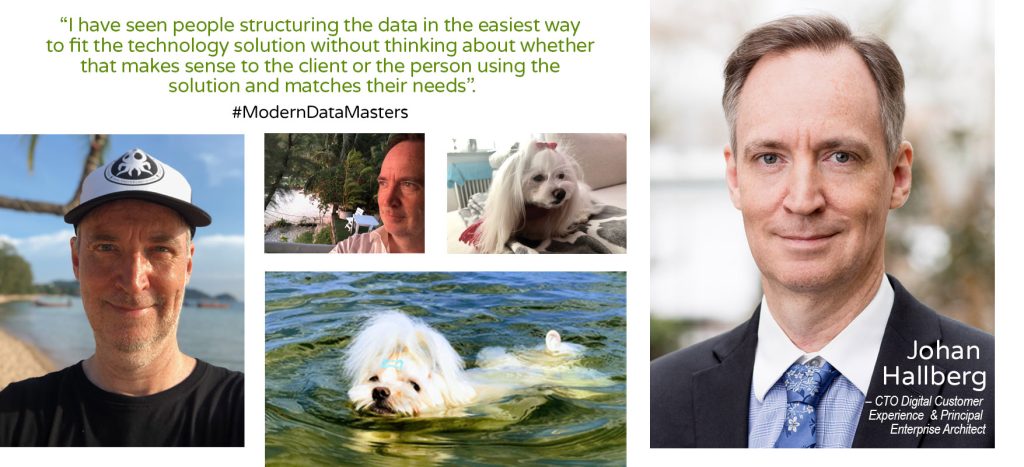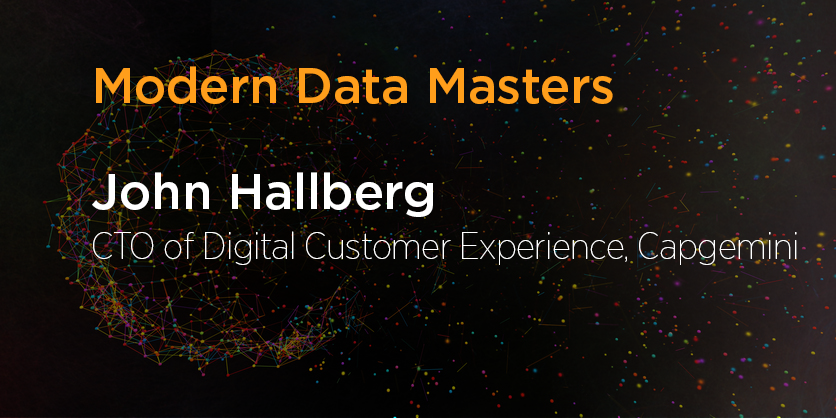Johan Hallberg is the CTO of Digital Customer Experience and Head of Centre of Excellence for Enterprise Architecture at Capgemini in Stockholm. He is very knowledgeable about all aspects of Master Data Management and Customer Experience having worked as an industry analyst; senior consultant and enterprise architect on both client and advisor side. Johan is a passionate believer in using technology to drive business value in the experience economy.
What was your route into data management particularly in relation to the Digital Customer Experience?

We need to go back a long way! My maternal grandfather was an inventor with probably 30-40 patents in the paper industry and I went to work with him a few times. My father was an engineer at Ericsson – he would bring things home like CPU cards with some LED lights on them or something very simple. I started programming those in order to make the lights flash.
“What really drove me was playing computer games, so I started to develop those myself in Basic and other languages. I learned very fast because I was having fun.”
I started work as a developer at Ericsson on military applications such as radar systems. We did all the programming for this on a PC and realised we could use MSFT SQL so then it was all about how to structure the data and pull it into the database.
Throughout my career I have managed many projects with huge amounts of data – first as a developer then an enterprise architect and CTO on the business side of it. Some work I did at a large Swedish bank that wanted to create a “Client Register” was what really got me thinking about the customer experience. This bank had been very advanced in terms of online payments. As early as 1998/9 their clients could pay bills on an Ericsson phone using WAP – but they were very late with the first app for iOS or Android. They had started so early, and the code-base was so huge, that the job to transfer it to something newer was a very big one.
“We had already recommended MDM in order to get a single view of the customer but the main focus for them was on how the customer would use the online interfaces. That’s where I realised even more the importance of a great customer experience and its essential connection to validated master data with clear ownership.”
How would you define “modern” data management and what does it /should it mean for organisations that adopt it?
First there is the question of who is taking responsibility for and ownership of the data? It should be the business because it is a business asset. Increasingly business people are understanding that they should own the data, and not IT – we are not there yet of course but business value is the most important thing.
The other big area is graph databases. Going back 10 years when we did not have the types of graph databases we had today, it was very difficult just to handle the data on the different parties, products, orders, locations etc. We didn’t have this notion of trying to handle the relationships themselves – households, businesses, accounts etc. That’s where it has changed.
“Graph technology means that is all about managing the relationships and then the data is connected to those relationships – not the other way around. There are new ways to handle the data and you can look at it in ways you could not do before – it was just too hard to do this using ordinary, relational databases.”
What aspects of modern data management solutions does Capgemini’s DCX team focus on and how do you help your clients deliver them?
Today DCX is all about communication to the customer across different channels using various tools and techniques and also helping employees use the systems in a better way than they did before. Data management is something that supports these things and for me it is all about the interactions – are we using smart AI assistants for example? How do we use the data to see patterns of what customers are doing so we can recommend the best products or services to them? We help our clients use data in a way that makes the best sense and will deliver benefits for their business.
Modern data management processes deliver the data that my teams need to help our clients do things better. We all know that it is rubbish in and rubbish out but this tends to get forgotten.
“Business people in particular just don’t understand the complexity of getting data that is of the right quality – they say it is IT that should worry about it but IT says it is the business that keeps putting in the bad data!”
If you don’t have high quality, accurate data, then the analytics will be irrelevant for the client because the answers will be wrong.
What are your top 3 tips or resources to share for aspiring modern data masters?
- Always stay current and understand that you have to undertake life-long learning because things are only going to change faster and faster.
- Data management is a huge area so it’s better to focus on certain aspects that interest you, whether it is the business side or the IT side. You need to take the time to be specialised as well as understand the bigger picture.
- Understand that data is a business asset. Act upon that, work with the data so it always makes sense to the client or the business.
“I have seen people structuring the data in the easiest way to fit the technology solution without thinking about whether that makes sense to the client or the person using the solution and matches their needs.”
You have a lot of experience and success in the data management field – can you tell us about a time where things did not go so well; what you did to fix this and what you learned from that?
I’m trying to think which one to choose – I totally agree that making mistakes is what helps you grow and keeps you on your toes. One of the hardest things I’ve ever done was a time when I had to give a key note presentation to a large audience. I was very stressed that day for various reasons, but in particular because I had been so busy that I had not had enough time to write suitable speaker notes.
“The main issue was my stress level – I was going to talk for 45-50 minutes and after 2 minutes on stage I forgot everything and I had no clue what to say.”
That has never happened before or since and I know it was because of my stress levels and because I did not make enough time to prepare. You can take care of that stress level by simple things – breathe, talk to your friends, be sure that you are ready. If you think you are prepared enough, prepare a little bit more, just to be on the safe side. It is easy to forget this especially when you travel a lot and you are busy.
“I learned to make the time to prepare more; to make enough time to rest and do whatever it takes to make sure I could focus on the task. I think one thing to understand is how much your personal health and anxiety levels can affect your work.”
What trends or changes do you predict to the data management arena in the next few years?
We will see things becoming more “cloudified” – there just is not as much need to have data on-premise. I will also stress the need to keep it secure and manage it in the right way and that the laws and regulations on this will increase. We have seen that the lawmakers have not really been on top of what it is possible to do with the data out there – they need to pick up the pace.
“This means that future solutions and start-ups will have to pay even more attention to the security and management areas and the flexibility to make changes to their solutions to meet different laws, regulations and client needs.”
Also we will see more AI, more deep learning, more ML – not because they are just hype but because they are real.
“We used to talk about mobile first, then cloud first and now we are starting to talk about AI first – at some point we need to start talking about human first.”
We have discussed how AI will automate things but humans have to come first – that might be the next trend. The data is a business asset but it is our asset – us as humans – we need to take care of it.
What do you like to do outside of work?
I love going out with my dog – a Maltese – he doesn’t like to go out too much especially when it’s bad weather so that’s perfect! I have also started to bike more again and I am a music addict – everything from rock to melodic jazz to classical. I have sung in Barber Shop groups; been in bands and worked as a sound engineer. In the Summer I always hope to play more golf but can’t do enough of that due to the Swedish weather and lack of time so the cycling helps me to be more active. Another passion is strategic board games – it keeps my brain awake!
Which is your favourite (science) fiction book, programme or film and why?
Well science fiction has been one of my large interests in life since I was a small boy. I have always loved Space. In 1977 I went to the premier of Star Wars and I’ve seen all of those films in the cinema. There are so many good movies, books and games that have come along so it is very hard to pick a favourite – most of it started with a TV series called Moonbase Alpha but I’d probably have to pick Star Wars with its universe and all that entails as my favourite.
Have you seen Guardians of the Galaxy 1 and 2?
“Of course! The humour in them is so good, and if you don’t have fun in life – what’s the point? Have imagination in what you do and look at what is happening moving forward and how to add your talent or capabilities into that. That’s what makes life worth living or at least it does for me.”

